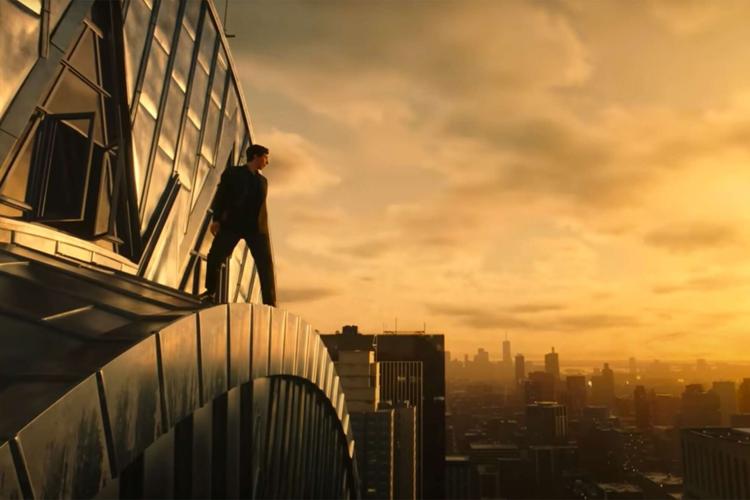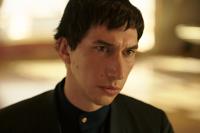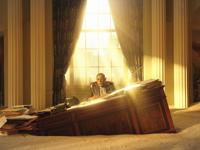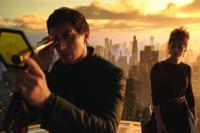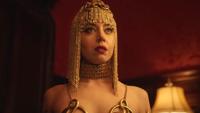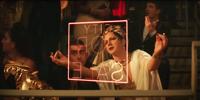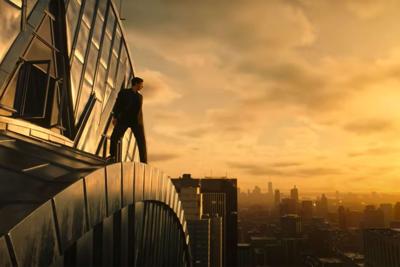Francis Ford Coppola is an iconic film director. He won five, Academy Awards. He won the Palme d'Or at the Cannes Film Festival twice. Cannes is where this film premiered. It comes 45 years after his last film at Cannes, that of Apocalypse Now (1979). Obviously, Coppola is best known for his classic, hit film, The Godfather (1973). He remained active through the 80's and 90's, but he slowed down over the past 20 years. One could argue that he's always been experimental. Most of his dramas or genre pictures were pretty straightforward, but the past 20 years have seen a shift more toward the experimental with Coppola leaning more toward the art-house crowd rather than the mainstream.
Making more experimental or art-house films is fine, if one makes them cheaply. Coppola's last, two art-house films were made for reportedly around $5 million, which is low budget by Hollywood standards. This film is reportedly budgeted at $120 million. The story is more epic and the cast is bigger. The film was shot in large format for IMAX screens or similar projection size. The film also utilizes a lot of visual effects, probably the most visual effects that any Coppola film has ever used. A lot of scenes were filmed on green screen and unfortunately, those scenes have noticeable seams and the artificiality is apparent.

Given this film is experimental and dealing mostly in metaphor and surrealism, that artificiality might be intended and warranted, but it creates an aesthetic that feels fake and sadly quite hollow. Nothing really feels solid. Coppola is of Italian heritage. His parents were immigrants. It's clear that Italian cinema was an inspiration for him. Whether it's Italian futurism or commedia all'italiana, which leaned into artificiality and ridiculousness, that hollowness here might be the point of Coppola's efforts. However, given the origins of this film's story and themes, it seems he had a lot of substance. Unfortunately, that substance gets rather lost. Coppola might be weaving together so many ideas that whatever his intent was gets muddled or what feels like very superficial treatment.
Adam Driver (Marriage Story and BlacKkKlansman) stars as Cesar Catilina, an architect who lives in a giant city called New Rome, which is patterned after New York. He either works for the city government or perhaps has his own company, but his goal is to rebuild the city with a new material he invented called Megalon. He clashes with the city's mayor who doesn't like Cesar's revolutionary ideas. The character was inspired by a real Roman politician and soldier named Lucius Sergius Catilina who attempted a coup d'etat or a conspiracy to overthrow the state in a violent insurrection. However, Cesar doesn't do any of those things. He barely does anything at all in this narrative.

Coppola was also clearly inspired by Fritz Lang's Metropolis (1927), which was about a city's hierarchy. Lang's classic was about the politicians and wealthy business magnates who were at the top versus the impoverished or working class on the bottom. Coppola weaves a narrative that is commenting on that same hierarchy in New Rome. Most of the focus is on one particular wealthy magnate and his family, but even that family's involvement here feels muddled. When we're not reveling in their opulent events, they're on the periphery not getting fully fleshed out.
Giancarlo Esposito (Better Call Saul and Breaking Bad) co-stars as Frank Cicero, the mayor of New Rome. He's against Cesar's plan to build a utopian city. The film never really delves into why he's so opposed to Cesar. Reportedly, Coppola also patterned Cesar after Robert Moses, an urban planner in New York City in the early 20th century. Moses is credited for a lot of projects that rebuilt New York City, presumably for the better. Yet, Moses is also considered controversial for accusations of racism, cronyism, spending too much and the ruination of certain areas of New York. Given that Frank is a person of color, one would think that those accusations against Moses would be what Frank uses against Cesar, but that's not exactly it.

Coppola doesn't seem to give Cesar any real points of criticism. Cesar is accused of a serious crime that lands him in jail, but it's obvious that he was set up. Cesar comes across as a symbolic cypher otherwise. He has a tragic backstory that is also supposed to put a question mark over his head, but that's not played up in any kind of significant way. Cesar is accused of murdering his wife, but even that's not really given any real significant weight here.
Nathalie Emmanuel (Fast X and Game of Thrones) also co-stars as Julia Cicero, the daughter of the mayor. She's very educated and very beautiful. Her father warns her off Cesar, but Julia instead starts working for Cesar at his company or department. It seems as though she's like a secretary or an assistant. Spending time with him, she falls in love and her relationship causes friction with her and her father. This is probably the only really compelling aspect of the film, despite other parts that draw attention.

Aubrey Plaza (Agatha All Along and Parks and Recreation) plays Wow Platinum, a TV host who ingratiates herself into the wealthiest family in New Rome, the Crassus family. Her goal is to use that family for its money by being a honeypot. She's giving an over-the-top performance that's entertaining. Shia LaBeouf (The Peanut Butter Falcon and Transformers) rounds out the cast as Clodio, the antagonist of this film who comes across as more of a Batman villain, an incestuous, sneaky, fake populist. He often feels like he's in a completely separate film that has nothing to do with Cesar, the protagonist.
Finally, Cesar is shown to have a magical power. He's able to stop time. Literally, he can freeze the world, except himself. It seems like it's a fantastical element that's going to be important. Yet, Coppola doesn't do anything with it. Maybe, it's meant to be symbolic to show how everyone else is stuck in time while he's able to move forward. Beyond that, I'm not sure what the purpose was.

Rated R for sexual content, nudity, drug use, language and some violence.
Running Time: 2 hrs. and 18 mins.
In theaters.


